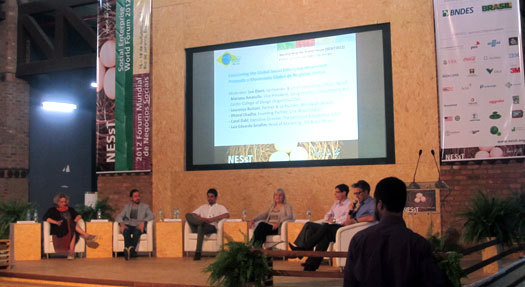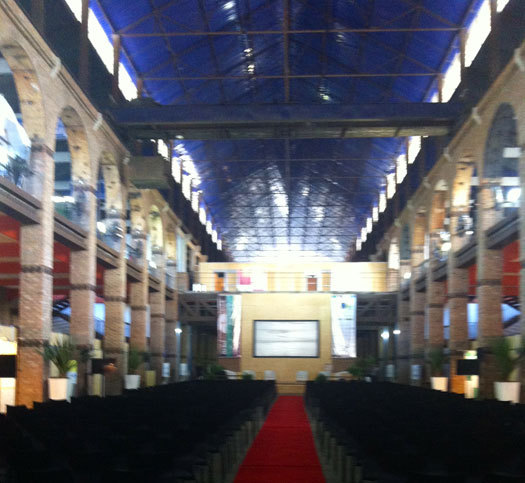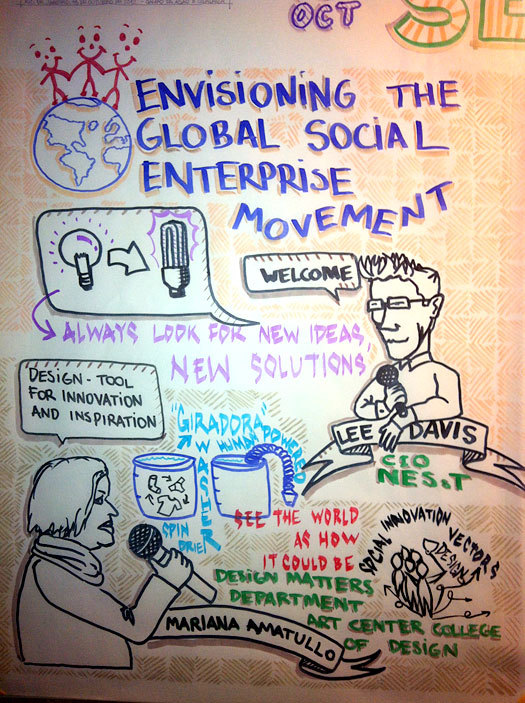
“Envisioning the Global Social Enterprise Movement” keynote panel at the 2012 Social Enterprise World Forum.
Last month, I had the great privilege to attend the Social Enterprise World Forum (SEWF), one of the premier global events focused exclusively on social enterprise and on building global awareness of the effectiveness of social enterprise in solving critical social problems. SEWF2012 was held in the iconic city of Rio de Janeiro. masterfully organized this year by the Brazilian-based team of NeSst with the leadership of NeSst co-founder and Chief Innovation Officer, Lee Davis.
The venue for the event was an imposing hall, the Centro Cultural Ação da Cidadania (a late 19th century converted storage facility) in the center of Porto Maravilha, which translates to “Marvaleous Port,” and is part of the multi-billion dollar redevelopment effort underway in Rio, leading up to the 2014 World Cup and the 2016 Summer Olympics. This historic waterfront and harbor area boasts urban revitalization initiatives that cover five million square meters, and will be home to the much anticipated “Museum of Tomorrow” by the Spanish architect Santiago Calatrava, sited on the Mauá pier and designed to support global exhibition programming on the future of the earth and the world population’s ecological footprint.

Centro Cultural Ação da Cidadania
Coinciding with NeSst’ s fifteen year anniversary, SEWF2012’s focus was the growing field of social impact investment and included a remarkable lineup of Brazilian and international speakers as well as some six hundred participants who are engaged in precisely this kind of work. Eight parallel tracks sessions addressed everything from social enterprise in Brazil to case studies and models; management and skill-building; leadership, education and youth; finance and investment, economic opportunity and social justice; the growing environment for social enterprise, and — last but not least — innovation, invention and design, a track sponsored by the Lemelson Foundation in conjunction with 3M Brazil’s Social Innovation Institute. Along with US-based peer design educators Liz Ogbu, CAA faculty and former IDEO.org fellow and Mike Weikert, Director of the Masters of Arts in Social Design at MICA (see sidebar below about the design thinking “Social Enterprise Lab” which they co-facilitated at the conference) I found myself immersed in a great discussion about the catalytic role of design for social impact. Many participants on my dynamic panel (it was moderated by Lemelson program officer Abby Sarmac with NCIIA grants manager and colleague Jennifer Keller Jackson) highlighted the critical importance of the idea stage in the social innovation pipeline, focusing on how vital designers’ contributions are to the essential processes of invention, social healing and regeneration.
I had been invited to share some of the ongoing lessons emerging from the social design work being produced by our students and faculty at ArtCenter (working with community-based organizations and NGOS through the portfolio of Designmatters) and I spoke more generally about the potent role design can play as enabler and mediator within economic, political and social forces ― all of which are shifting at such a rapid pace when it comes to sustainable development and innovation. It was exhilarating to experience genuine interest, probing questions, and overall enthusiasm from many of the SEWF participants for whom this actionable form of design remains novel. In fact, that sense of discovery and promise which treats design as a driver of fundamental and humane aspirations for a better world, was one of my central take-away messages. It was also a recurrent theme in our keynote panel “Envisioning the Global Social Enterprise Movement,” which wrapped up the second morning of the event with a thrilling sense of forward-looking progress.

There were many teachable moments and special exchanges for those of us representing the design contingent of SEWF2012. Like all conferences, many of them resided for me in quiet one-on-one conversations with attendees and colleagues, but also against the rousing environment of Rio and the immediacy of experiencing some of the terrific projects and people visited during the site visits to local social enterprises that the SEWF2012 team facilitated. Just “being open to the new, the different and the true,” to borrow the words of German philosopher Gadamer, was deeply inspiring. At every turn, SEWF2012 was also a collaborative platform that reminded me of one of my favorite metaphors about what makes social entrepreneurs tick, one that is captured in part in the NeSst tag line:
if you believe you can fly, you will fly.
Here’s to more designers in our midst doing just that ― embracing with confidence the formidable spark of social entrepreneurship.
